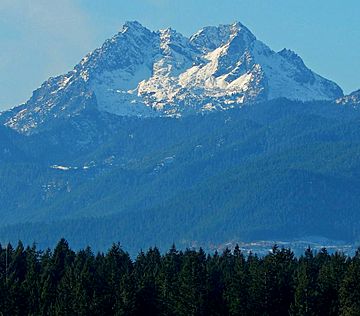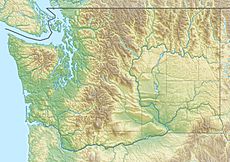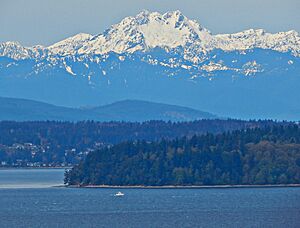The Brothers (Olympic Mountains) facts for kids
Quick facts for kids The Brothers |
|
|---|---|

East face in winter
|
|
| Highest point | |
| Elevation | 6,842 ft (2,085 m) NGVD 29 |
| Prominence | 2,682 ft (817 m) |
| Geography | |
| Parent range | Olympic Mountains |
| Topo map | USGS The Brothers |
| Geology | |
| Age of rock | Eocene |
| Type of rock | Basalt |
| Climbing | |
| Easiest route | Scrambling |
The Brothers are two tall mountain peaks in the Olympic Mountains. You can find them in the Pacific Northwest, close to the Hood Canal in Washington state. They sit right on the edge of Olympic National Park and The Brothers Wilderness.
The south peak is the taller one, reaching about 6,842 feet high. It is 192 feet taller than the north peak. There are no official hiking trails that go all the way to the top. However, climbing the south peak is not considered very difficult. The Brothers have a unique look with their two peaks, which makes them easy to spot from the city of Seattle.
How Did The Brothers Get Their Name?
In 1856, a surveyor named George Davidson gave these mountains their name. He named them to honor the two brothers of Ellinor Fauntleroy, who would later become his wife. He called the southern peak Mount Edward and the northern peak Mount Arthur.
Later, in 1968, some people suggested renaming the mountains "The Brothers Kennedy." This idea was to honor John F. Kennedy and Robert F. Kennedy. But the United States Board on Geographic Names did not approve this new name.
What's the Weather Like at The Brothers?
The Brothers are located in the eastern part of the Olympic Mountains. This area has a marine west coast climate. This means the weather is often influenced by the ocean.
Most of the weather systems start over the Pacific Ocean. They then travel northeast towards the Olympic Mountains. As these weather systems get close, the tall peaks of the Olympic Range force the air upward. This causes the air to cool down and drop its moisture. This moisture falls as rain or snow. This process is called Orographic lift.
Because of this, the Olympic Mountains get a lot of rain and snow, especially in winter. During the winter, it's usually cloudy. But in the summer, high-pressure systems over the Pacific Ocean often bring clear skies. The snow here tends to be wet and heavy because of the ocean's influence. This can sometimes lead to a higher risk of avalanches.
 | John T. Biggers |
 | Thomas Blackshear |
 | Mark Bradford |
 | Beverly Buchanan |




